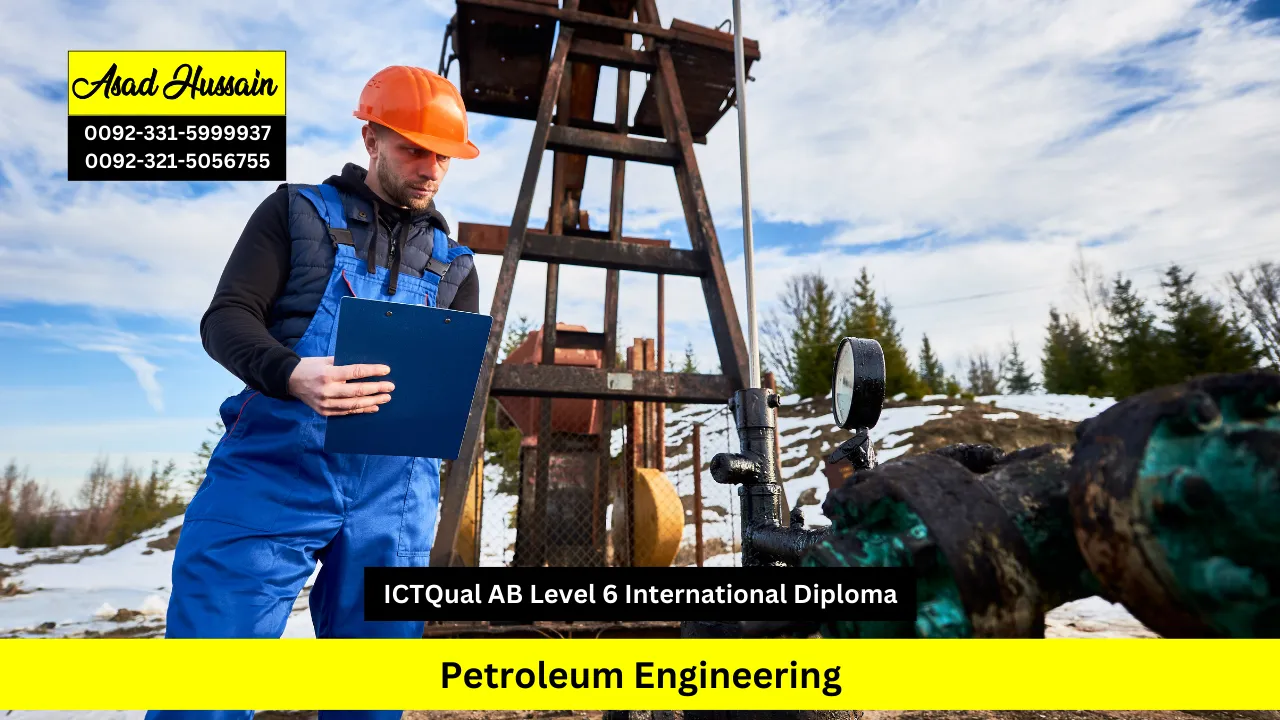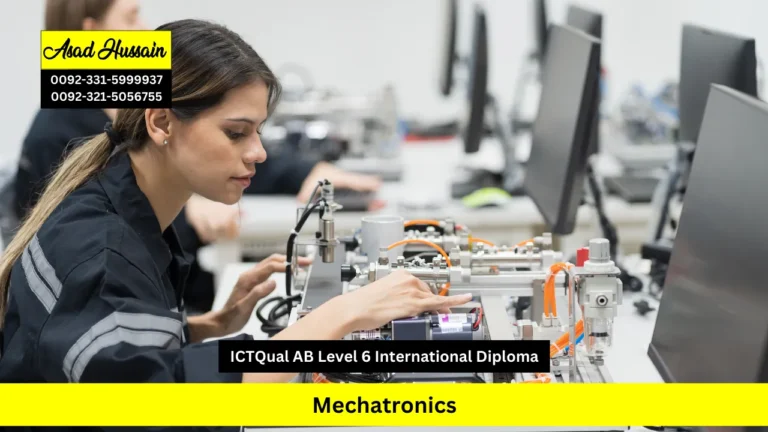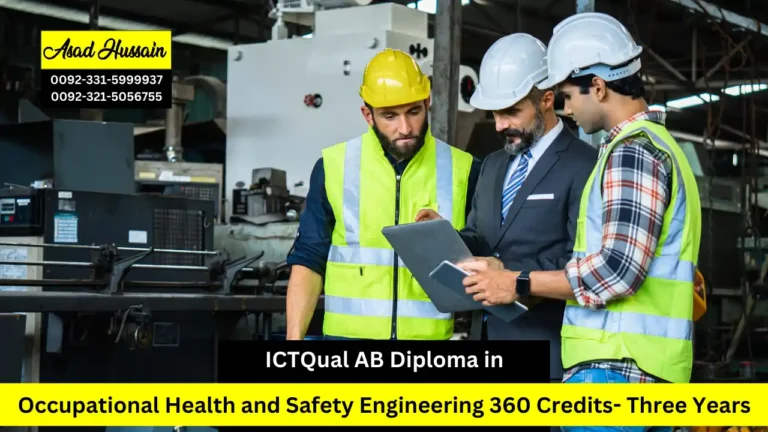The global energy sector relies heavily on highly skilled petroleum engineers to ensure efficient, safe, and sustainable extraction and management of oil and gas resources. The ICTQual AB Level 6 International Diploma in Petroleum Engineering is designed to equip learners with advanced knowledge, technical expertise, and practical skills essential for a successful career in this dynamic industry.ICTQual AB Level 6 International Diploma in Petroleum Engineering is suitable for both freshers seeking a strong foundation and professionals aiming to enhance their expertise in petroleum engineering and related fields.
Spanning three years and 360 credits, the ICTQual AB Level 6 International Diploma in Petroleum Engineering covers a comprehensive range of topics, including petroleum geology, reservoir engineering, drilling and production technology, petroleum project management, and health, safety, and environmental practices in the oil and gas sector. Learners will gain practical experience in well design, production optimization, hydrocarbon exploration, and data analysis, alongside theoretical knowledge that underpins engineering decision-making and strategic planning.
Graduates of this diploma will develop the skills to analyze complex reservoir data, design and manage drilling operations, optimize production systems, and implement safe and environmentally responsible practices. ICTQual AB Level 6 International Diploma in Petroleum Engineering also emphasizes modern tools and technologies in petroleum engineering, preparing learners to adapt to innovations in drilling, extraction, and resource management.
Enrolling in the ICTQual AB Level 6 International Diploma in Petroleum Engineering allows learners to obtain a globally recognized qualification, develop both technical and managerial competence, and position themselves for leadership, specialist, and strategic roles within the oil, gas, and energy sectors worldwide.
Program Highlights
Study Units
This qualification, the ICTQual AB Level 6 International Diploma in Petroleum Engineering, consists of 36 mandatory units.
Year 1 – Foundation in Petroleum Engineering
- Principles of Petroleum Engineering
- Engineering Mathematics
- Fundamentals of Mechanical and Electrical Engineering
- Introduction to Petroleum Geology
- Drilling Engineering Fundamentals
- Engineering Drawing and Computer-Aided Design (CAD)
- Basics of Reservoir Engineering
- Well Logging and Formation Evaluation
- Health, Safety, and Environmental Practices in Petroleum Engineering
- Communication and Technical Report Writing
- Introduction to Project Management in Engineering
- Introduction to Oil & Gas Industry Operations
Year 2 – Intermediate Studies in Petroleum Engineering
- Advanced Drilling and Well Control
- Reservoir Rock and Fluid Properties
- Production Engineering and Well Completion
- Petroleum Facilities and Pipeline Engineering
- Applied Thermodynamics and Fluid Mechanics
- Petroleum Project Planning and Management
- Oil & Gas Exploration Techniques
- Enhanced Oil Recovery Methods
- Industrial Maintenance and Reliability in Petroleum Operations
- Applied Research Methods in Petroleum Engineering
- Sustainable Practices and Environmental Management in Petroleum
- Oil and Gas Economics and Cost Control
Year 3 – Advanced Studies in Petroleum Engineering
- Advanced Reservoir Simulation and Modelling
- Petroleum Production Systems and Optimisation
- Offshore and Subsea Engineering
- Advanced Drilling Technology and Well Intervention
- Advanced Fluid Flow and Multiphase Systems
- Petroleum Safety, Risk, and Quality Management
- Smart Technologies and Industry 4.0 in Oil & Gas
- Robotics and Automation in Petroleum Operations
- Cyber-Physical Systems and IoT in Petroleum Engineering
- Professional Ethics and Sustainability in Petroleum Engineering
- Innovation and Entrepreneurship in Oil & Gas Technology
- Final Year Major Project (Capstone Project)
The ICTQual AB Level 6 International Diploma in Petroleum Engineering is designed to provide learners with advanced technical knowledge and practical skills for a career in the oil, gas, and energy sectors. To ensure learners can successfully complete this comprehensive programme, candidates must meet the following entry requirements.
Age Requirements
- Learners must be at least 18 years old at the time of enrolment
- There is no upper age limit, allowing both young learners and experienced professionals to apply
Educational Requirements
- A minimum of a high school diploma or equivalent qualification is required
- Candidates with prior education in engineering, geology, or science-related fields are preferred
- Related courses such as Level 5 Diploma in Petroleum Engineering, Mechanical Engineering, or Oil & Gas Technology provide a strong foundation
Professional Experience
- Experienced learners should have at least 2–3 years of verifiable experience in petroleum, oil and gas, or energy-related roles
- Fresh learners without professional experience are welcome but will need to complete all 36 assignments and practical projects
English Language Proficiency
- Learners must demonstrate proficiency in English, both written and spoken
- Acceptable evidence includes recognized English language qualifications (e.g., IELTS 5.5 or equivalent) or proof of prior education in English
Enrolling in the ICTQual AB Level 6 International Diploma in Petroleum Engineering ensures that learners have the necessary academic background, professional experience, and language proficiency to successfully complete the programme and excel in global petroleum engineering roles.
The ICTQual AB Level 6 International Diploma in Petroleum Engineering is designed to equip learners with internationally recognized technical knowledge, practical skills, and managerial expertise required in the oil, gas, and energy industries. Over three years and 36 mandatory units, learners will gain competencies in petroleum exploration, drilling, production, reservoir management, safety, and sustainable operations. The learning outcomes are specific, measurable, and aligned with industry standards, preparing learners for professional and leadership roles.
Year 1 – Foundation in Petroleum Engineering
Principles of Petroleum Engineering
- Understand the core principles of petroleum engineering and the oil and gas value chain
- Analyze hydrocarbon formation, extraction, and reservoir characteristics
- Apply fundamental concepts to problem-solving in petroleum operations
- Develop awareness of industry practices and regulatory requirements
Engineering Mathematics
- Apply mathematical methods to solve engineering problems
- Use calculus, linear algebra, and statistics for petroleum engineering calculations
- Interpret and model data for reservoir and production analysis
- Develop analytical skills for practical engineering applications
Fundamentals of Mechanical and Electrical Engineering
- Understand mechanical and electrical systems relevant to petroleum operations
- Apply engineering principles to machinery, equipment, and operational processes
- Solve technical problems in oil and gas facilities
- Develop foundational skills for advanced petroleum engineering applications
Introduction to Petroleum Geology
- Understand geological formations, sedimentary basins, and hydrocarbon reservoirs
- Analyze subsurface data for exploration and drilling decisions
- Apply geological principles to reservoir characterization
- Develop practical skills in interpreting geological maps and core samples
Drilling Engineering Fundamentals
- Understand drilling rig components, equipment, and operations
- Apply basic drilling techniques and well design concepts
- Analyze wellbore stability and drilling parameters
- Develop practical skills in planning and monitoring drilling operations
Engineering Drawing and Computer-Aided Design (CAD)
- Interpret and create engineering drawings for petroleum systems
- Apply CAD tools to design oil and gas facilities and components
- Communicate technical designs effectively through visual representations
- Develop skills for practical engineering documentation
Basics of Reservoir Engineering
- Understand reservoir properties, fluid flow, and pressure behavior
- Apply material balance and volumetric methods to estimate reserves
- Analyze reservoir performance for production planning
- Develop skills in basic reservoir simulation techniques
Well Logging and Formation Evaluation
- Interpret well logging data to assess reservoir properties
- Analyze formation evaluation reports for drilling and production decisions
- Apply logging techniques for hydrocarbon identification
- Develop practical competencies in subsurface evaluation
Health, Safety, and Environmental Practices in Petroleum Engineering
- Understand occupational health and safety standards in petroleum operations
- Apply environmental regulations and sustainability principles
- Identify hazards and implement risk mitigation strategies
- Develop skills to maintain safe and compliant operational practices
Communication and Technical Report Writing
- Prepare professional technical reports and documentation
- Communicate complex engineering information clearly and effectively
- Develop presentation skills for technical and managerial audiences
- Apply written communication standards in petroleum engineering projects
Introduction to Project Management in Engineering
- Understand project management methodologies and lifecycle
- Plan, schedule, and monitor engineering projects
- Apply project management tools to petroleum engineering tasks
- Develop skills in resource allocation, risk management, and reporting
Introduction to Oil & Gas Industry Operations
- Understand upstream, midstream, and downstream operations
- Analyze operational workflows, production systems, and industry standards
- Develop awareness of organizational structures and roles
- Apply foundational knowledge to real-world petroleum engineering scenarios
Year 2 – Intermediate Studies in Petroleum Engineering
Advanced Drilling and Well Control
- Apply advanced drilling techniques and well control procedures
- Analyze wellbore stability, kick detection, and pressure management
- Develop practical skills in drilling safety and intervention strategies
- Implement best practices in complex drilling operations
Reservoir Rock and Fluid Properties
- Understand rock and fluid characteristics affecting hydrocarbon recovery
- Analyze petrophysical properties for reservoir evaluation
- Apply laboratory and field data to optimize production
- Develop skills in reservoir characterization and fluid analysis
Production Engineering and Well Completion
- Design well completions for optimum hydrocarbon recovery
- Apply production engineering principles to enhance well performance
- Monitor production systems and identify optimization opportunities
- Develop practical skills in production planning and equipment selection
Petroleum Facilities and Pipeline Engineering
- Understand design, operation, and maintenance of petroleum facilities and pipelines
- Apply engineering principles to ensure safe and efficient transport
- Analyze facility layouts, flow dynamics, and operational challenges
- Develop practical competencies in pipeline engineering and facility management
Applied Thermodynamics and Fluid Mechanics
- Apply thermodynamic and fluid mechanics principles to petroleum processes
- Analyze multiphase flow, pressure drop, and heat transfer in pipelines and reservoirs
- Solve engineering problems in production and processing systems
- Develop analytical and practical skills for petroleum applications
Petroleum Project Planning and Management
- Plan and manage petroleum engineering projects efficiently
- Allocate resources, schedule activities, and control project costs
- Apply risk management and decision-making techniques
- Develop project leadership and operational management skills
Oil & Gas Exploration Techniques
- Understand seismic, geophysical, and geological exploration methods
- Analyze exploration data for reservoir identification and evaluation
- Apply exploration techniques for resource estimation and development planning
- Develop practical skills in exploration strategy and decision-making
Enhanced Oil Recovery Methods
- Understand methods such as water flooding, gas injection, and chemical EOR
- Apply enhanced recovery techniques to improve reservoir performance
- Analyze effectiveness and feasibility of EOR strategies
- Develop practical skills in reservoir optimization
Industrial Maintenance and Reliability in Petroleum Operations
- Implement maintenance strategies for petroleum equipment and facilities
- Apply reliability engineering principles to minimize downtime
- Analyze system failures and develop preventive measures
- Develop practical maintenance planning and monitoring skills
Applied Research Methods in Petroleum Engineering
- Conduct independent research using scientific and engineering methods
- Analyze data and present findings in technical formats
- Apply research insights to solve practical petroleum engineering challenges
- Develop skills in critical thinking and problem-solving
Sustainable Practices and Environmental Management in Petroleum
- Apply sustainability principles to petroleum operations
- Implement environmental management plans and compliance strategies
- Evaluate ecological impact and optimize resource usage
- Develop awareness of corporate social responsibility in oil and gas
Oil and Gas Economics and Cost Control
- Analyze financial aspects of petroleum projects
- Apply cost control, budgeting, and economic evaluation techniques
- Assess project feasibility and profitability
- Develop skills in financial decision-making and resource optimization
Year 3 – Advanced Studies in Petroleum Engineering
Advanced Reservoir Simulation and Modelling
- Use simulation software to model reservoir behavior
- Analyze production forecasting and optimization strategies
- Apply advanced techniques for reservoir management decisions
- Develop practical skills in reservoir modeling and data interpretation
Petroleum Production Systems and Optimisation
- Optimize production systems for maximum efficiency
- Analyze production constraints and implement solutions
- Apply engineering principles to improve well and field performance
- Develop practical competencies in production engineering
Offshore and Subsea Engineering
- Understand design and operation of offshore platforms and subsea systems
- Apply engineering solutions for offshore drilling and production
- Analyze environmental, safety, and logistical challenges
- Develop practical skills in offshore engineering operations
Advanced Drilling Technology and Well Intervention
- Implement advanced drilling methods and well intervention techniques
- Analyze complex drilling scenarios and troubleshoot operational issues
- Develop skills in drilling optimization, safety, and technology applications
- Apply practical solutions in challenging petroleum operations
Advanced Fluid Flow and Multiphase Systems
- Understand multiphase flow dynamics in wells and pipelines
- Apply fluid mechanics principles to optimize production and transport
- Analyze flow behavior to mitigate operational risks
- Develop practical skills in flow assurance and system design
Petroleum Safety, Risk, and Quality Management
- Implement safety protocols and risk assessment strategies
- Apply quality management systems to petroleum operations
- Analyze hazards and develop mitigation plans
- Develop professional competence in operational safety and compliance
Smart Technologies and Industry 4.0 in Oil & Gas
- Understand digital transformation and automation in petroleum engineering
- Apply IoT, sensors, and real-time monitoring to optimize operations
- Analyze data-driven solutions for operational efficiency
- Develop skills in implementing smart technologies in oil and gas
Robotics and Automation in Petroleum Operations
- Use robotic systems for maintenance, inspection, and operational efficiency
- Apply automation techniques to reduce human intervention and enhance safety
- Analyze workflows for automation opportunities
- Develop practical skills in implementing robotics in petroleum facilities
Cyber-Physical Systems and IoT in Petroleum Engineering
- Integrate cyber-physical systems for monitoring and controlling petroleum operations
- Apply IoT for predictive maintenance and process optimization
- Develop skills in data acquisition, analysis, and system integration
- Enhance operational efficiency and safety through technological solutions
Professional Ethics and Sustainability in Petroleum Engineering
- Apply ethical principles in engineering decision-making
- Implement sustainable practices across petroleum operations
- Evaluate social, environmental, and economic impacts of engineering projects
- Develop professional accountability and responsible engineering practices
Innovation and Entrepreneurship in Oil & Gas Technology
- Identify opportunities for innovation in petroleum engineering
- Develop entrepreneurial solutions for operational or technological challenges
- Analyze feasibility and market potential of new initiatives
- Present practical solutions for business or technical improvements
Final Year Major Project (Capstone Project)
- Conduct an independent, applied petroleum engineering project
- Integrate theoretical knowledge, technical skills, and research insights
- Demonstrate problem-solving, project management, and professional communication
- Present findings to academic and industry evaluators with actionable recommendations
Graduates of the ICTQual AB Level 6 International Diploma in Petroleum Engineering will possess a globally recognized qualification, advanced technical knowledge, and practical skills across drilling, reservoir management, production optimization, safety, and smart technologies. This programme prepares learners for leadership, specialist, and strategic roles in the oil, gas, and energy sectors worldwide.
The ICTQual AB Level 6 International Diploma in Petroleum Engineering is designed for learners who wish to gain advanced technical knowledge, practical skills, and strategic expertise in petroleum engineering. This programme is suitable for both freshers and professionals seeking to build or advance their careers in the oil, gas, and energy sectors.
Aspiring Petroleum Engineers
- Learners looking to establish a strong foundation in petroleum exploration, drilling, and production
- Individuals seeking practical skills in reservoir management, well design, and hydrocarbon recovery
- Those aiming to understand industry-standard practices and technologies
Industry Professionals Seeking Career Advancement
- Professionals with experience in oil, gas, or energy sectors aiming to enhance their qualifications
- Learners targeting managerial, technical, or strategic roles in petroleum operations
- Individuals seeking to stay competitive with updated knowledge of modern petroleum technologies
Graduates of Related Engineering Disciplines
- Learners from mechanical, chemical, or civil engineering backgrounds looking to specialize in petroleum engineering
- Those seeking to apply engineering principles to oilfield operations, offshore platforms, and subsea systems
- Individuals aiming to integrate multidisciplinary knowledge into petroleum engineering projects
Entrepreneurs and Industry Innovators
- Learners interested in developing entrepreneurial solutions for the energy sector
- Individuals seeking skills in innovation, project management, and business development in petroleum technologies
- Those aiming to explore opportunities in sustainable energy, smart technologies, or automation in oil and gas
Digital and Technology-Focused Learners
- Learners eager to gain expertise in automation, IoT, robotics, and smart systems in petroleum operations
- Individuals aiming to optimize processes using modern technologies and data-driven solutions
- Those focused on enhancing operational efficiency, safety, and sustainability through technology
This programme equips learners with the technical knowledge, practical competencies, and strategic insights required to excel in the petroleum, oil, and gas industry, preparing them for advanced, specialized, and leadership roles globally.
As an approved centre of ICTQual AB, learners must enrol with us to pursue the ICTQual AB Level 6 International Diploma in Petroleum Engineering. There are two certification routes depending on the learner’s experience
Route for Experienced Professionals
- Provide proof of at least 6 years of verifiable professional experience in petroleum, oil, gas, or energy-related roles
- Certain assignments or modules may be waived based on prior experience and competencies
- Complete the relevant assessments and projects as determined by ICTQual AB
- Receive guidance and support throughout the certification process
- Demonstrate advanced knowledge and practical skills through assessments and applied projects
- On successful completion, receive the ICTQual AB Level 6 International Diploma in Petroleum Engineering
Route for Fresh Candidates
- Complete all 36 assignments and practical projects included in the programme
- Receive continuous assessment, constructive feedback, and guidance from instructors
- Gain comprehensive theoretical and practical knowledge in petroleum engineering, drilling, production, and reservoir management
- Demonstrate competencies through assignments, case studies, and the final year capstone project
- Participate in guided learning and mentorship throughout the programme
- On successful completion, receive the ICTQual AB Level 6 International Diploma in Petroleum Engineering
As an approved centre of ICTQual AB, learners must enrol with us to obtain this globally recognized qualification. Both routes equip learners with practical, technical, and managerial skills essential for success in the petroleum, oil, and gas industry. Learners will develop expertise in drilling engineering, reservoir optimization, offshore and subsea operations, production systems, safety management, and the implementation of smart technologies and Industry 4.0 solutions, preparing them for specialist, managerial, and strategic roles worldwide.







